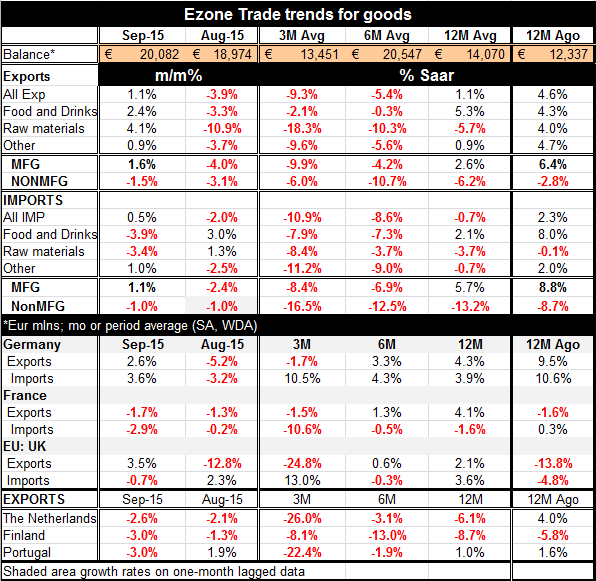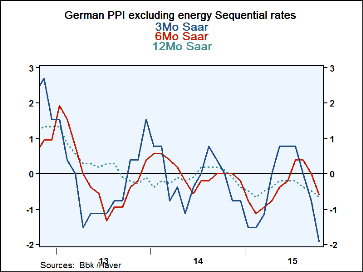 Global| Nov 20 2015
Global| Nov 20 2015Inflation divergence stalks Germany and EMU
Summary
In October the overall German PPI fell by 0.4%. The index fell excluding energy by 0.2%; manufacturing prices fell by 0.3%. The harmonized PPI fell by 0.3%. There is a consistency across the board of weakness in October and of price [...]

In October the overall German PPI fell by 0.4%. The index fell excluding energy by 0.2%; manufacturing prices fell by 0.3%. The harmonized PPI fell by 0.3%. There is a consistency across the board of weakness in October and of price declines. There can be no doubt but that energy prices are helping to push overall inflation measures lower. And there are knock-on effects so that lower oil prices will eventually cause some nonoil prices to be lower, too. And this knock-on impact is harder to get a handle on. But for now the German ex-energy PPI is showing weakness and declines on all horizons. Except for a small lesser rate of drop over six months compared to 12-months, the PPI is decelerating as the 3-mo pace is at -1.9% compared to -0.7% over 12 months. There is nothing in the pace or path of the ex-energy PPI that is encouraging. Mario Draghi is waging a verbal war against weak inflation and the German PPI seems to be just that culprit.
Draghi has been at this verbal assault long enough that it’s about time to take action or stop talking. We are now told that in the recent ECB meeting the body considered taking additional QE actions but did not. All of this smacks of too much prelude and not enough action. While the ECB may actually get off the dime and expand QE in December as it is now ‘threatening’ to do, do not expect much of it. I suspect that this delaying is because Draghi is trying to get all the push he can from changing expectations by the time the ECB actually does something. But if QE is expected to be a paper tiger, expectations of more won’t get the ECB very far. And Draghi may be fighting some internal discord.
QE is not a very potent weapon. Arguably Draghi can get almost as much push in markets by threatening to do more QE as by doing it. Germany has been unhelpful in the conduct of QE and has been trying to get the ECB to do the least potent form of QE possible. Germany stood in the way of doing any at all until the economy was so weak that QE commenced in an environment of already low interest rates leaving it little scope for any real impact. And there is even less scope now.
QE is being done in the U.S., in the U.K. and in Japan. In all three of those places the policy is still in effect but on hold. Once a central bank goes down the road to do some QE it reaches some point where it stops. Unfortunately, usually it stops at a point where the economy is still not all that robust. As we see in these examples the QE-using central banks, they do not want to do any more yet growth has not been restored to normal. Japan is still struggling and could use more stimulus. It talks about stepping up QE but does not. The U.K. is done with added QE stimulus and is looking to hike rates and begin to unwind QE but renewed economic weakness has interrupted that plan. In the U.S., after several rounds of QE and after noting its increasing ineffectiveness, the Fed simply announced it would stop, it did stop, and it is now on the verge of an actual rate hike amid a debate over whether the economy is strong enough. This experience is not the heartiest endorsement of QE.
Inflation in the US is positive with a core that is positive and above 1% -all still short of Fed targets. In Germany we see that the overall CPI has decelerated and is flat year-over-year with the ex-energy CPI at a 2.1% pace over the last three months. Two percent? That’s the ECB’s target!
Of course, the Bundesbank does not make monetary policy anymore for Germany instead that is done in a more centralized environment by the ECB. And since Germany has stronger inflation on the CPI side than most other EMU members there is discord brewing in EMU. The German core HICP rises at a 2.1% annual rate over three months while the French HICP runs at 0.7%., Italy’s runs at 1.0% and in Spain, core inflation falls by 0.1%. To the rest of the EMU membership and to EMU itself, inflation is too low. But in Germany it is on the verge of too-high.
The inflation progression for EMU is now turned on its head! For most of the history of EMU, Germany has been the low-inflation country. Now, suddenly, Germany is the high inflation country. This will make the Bundesbank representative on the ECB council very wary of further monetary stimulus of any sort. On guard, Mario!
Of course the German PPI is still weak and declining. But producer prices take some time to get reflected in the CPI or HICP…if at all.
The PPI is simply more volatile than the CPI. Even with energy excluded the swings in the PPI are well known to overshoot the swings in the CPI. But since 2012 the German ex-energy PPI has been consistently below the pace of the CPI and the divergence is growing.
All of these differences, among Germany and other EMU members, and between the CPI and PPI inflation trends simply make policymaking that much harder. The job takes on even more difficult proportions when you factor in the different views on inflation and the location of the actual inflation risks in the euro area. The evolving patterns of inflation in the euro-Zone will make for a policy nightmare. Things are about to get very interesting and that is without even speaking of migrants and their potential to create havoc and sow discord among EU and EMU members
Robert Brusca
AuthorMore in Author Profile »Robert A. Brusca is Chief Economist of Fact and Opinion Economics, a consulting firm he founded in Manhattan. He has been an economist on Wall Street for over 25 years. He has visited central banking and large institutional clients in over 30 countries in his career as an economist. Mr. Brusca was a Divisional Research Chief at the Federal Reserve Bank of NY (Chief of the International Financial markets Division), a Fed Watcher at Irving Trust and Chief Economist at Nikko Securities International. He is widely quoted and appears in various media. Mr. Brusca holds an MA and Ph.D. in economics from Michigan State University and a BA in Economics from the University of Michigan. His research pursues his strong interests in non aligned policy economics as well as international economics. FAO Economics’ research targets investors to assist them in making better investment decisions in stocks, bonds and in a variety of international assets. The company does not manage money and has no conflicts in giving economic advice.
More Economy in Brief
 Global| Feb 05 2026
Global| Feb 05 2026Charts of the Week: Balanced Policy, Resilient Data and AI Narratives
by:Andrew Cates







